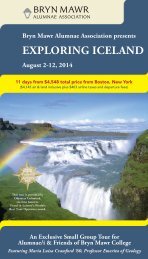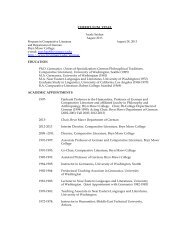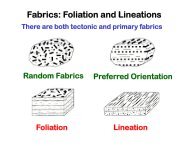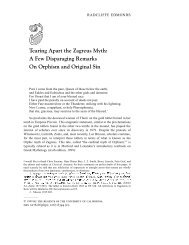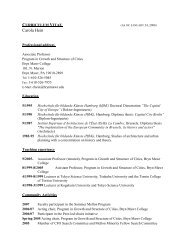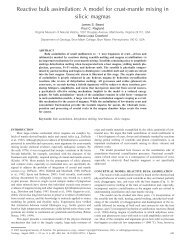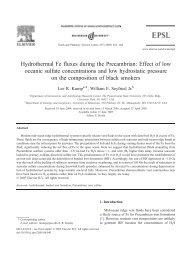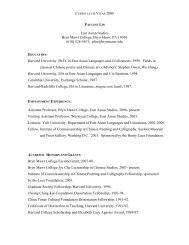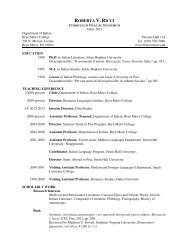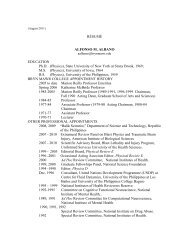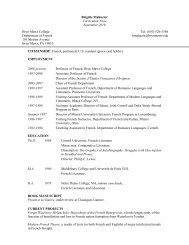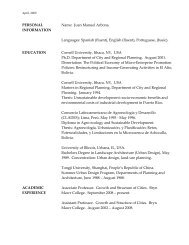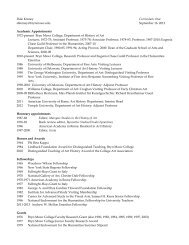Rediscovering Ying Qu and His Poetic Relationship to Tao Qian (clik ...
Rediscovering Ying Qu and His Poetic Relationship to Tao Qian (clik ...
Rediscovering Ying Qu and His Poetic Relationship to Tao Qian (clik ...
Create successful ePaper yourself
Turn your PDF publications into a flip-book with our unique Google optimized e-Paper software.
<strong>Ying</strong> <strong>Qu</strong> <strong>and</strong> <strong>His</strong> <strong>Poetic</strong> <strong>Relationship</strong> <strong>to</strong> <strong>Tao</strong> <strong>Qian</strong> 49<br />
the first admon i<strong>to</strong>ry shi collection written by an identifiable poet, an<br />
upper-class liter atus who imagines the hardship of the commoners<br />
<strong>and</strong> critiques the pretentious upper class for its obliviousness <strong>to</strong> the<br />
needs of the masses. Thus Zhong Rong pronounced <strong>Ying</strong> <strong>Qu</strong>’s work as<br />
“sincere <strong>and</strong> earnest in criticizing contemporary affairs; their elegant<br />
intentions are profound <strong>and</strong> far-reaching, attaining the [Shijing] poet’s<br />
objec tive of ‘radical satirizing.’”44<br />
The closest thematic <strong>and</strong> linguistic links between <strong>Ying</strong> <strong>Qu</strong>’s <strong>and</strong><br />
<strong>Tao</strong> <strong>Qian</strong>’s poetry can be found in the poetry fragments that I discuss<br />
below. Both poets write about their love of wine: <strong>Ying</strong> <strong>Qu</strong> has a poem<br />
where his headpiece falls off while he is in a drunken stupor, whereupon<br />
he is startled <strong>to</strong> discover his ugly face in the mirror—much in<br />
the same way that <strong>Tao</strong> <strong>Qian</strong> reflects on his own drunkenness.45 Both<br />
men are concerned with their poverty. In two untitled poetry fragments<br />
<strong>Ying</strong> <strong>Qu</strong> writes about a poor man who voices concerns about his<br />
(presumably <strong>Ying</strong> <strong>Qu</strong>’s) livelihood as he lies sleepless in bed.46 Finally,<br />
both poets are concerned with self-description: <strong>Ying</strong> <strong>Qu</strong> paints physical<br />
self-portraits in his writings, whereas <strong>Tao</strong> <strong>Qian</strong> expresses his emotions<br />
in the most lyrical of his poems.47 A fragment from the “Baiyi shi”<br />
provides a rare glimpse in<strong>to</strong> a personal moment, when <strong>Ying</strong> <strong>Qu</strong> speaks<br />
movingly about having reached the end of his life <strong>and</strong> being unable <strong>to</strong><br />
control his fate. Then the poem shifts <strong>to</strong> the conventional carpe diem<br />
theme, as the poet urges himself <strong>to</strong> drink up the wine.48<br />
Although a few of <strong>Ying</strong> <strong>Qu</strong>’s poems bear some similarities <strong>to</strong> <strong>Tao</strong><br />
<strong>Qian</strong>’s—whether in <strong>to</strong>pic or in style—they comprise only seven poems<br />
of <strong>Ying</strong> <strong>Qu</strong>’s extant corpus of thirty-six pieces. Xu Gongchi noted that<br />
the corpus can be divided in<strong>to</strong> two types of <strong>to</strong>pics: one was more<br />
44<br />
Shipin zhu, p. 144.<br />
45<br />
Lu Qinli, 1:470. See also n. 24, above.<br />
46<br />
Both are found in Lu Qinli: 1:472. The latter verse was attributed <strong>to</strong> <strong>Ying</strong> <strong>Qu</strong>’s son<br />
<strong>Ying</strong> Yuan in the Chuxue ji <strong>and</strong> the Ming anthologist Feng Weinan 馮 惟 訥 followed suit<br />
in his Shi ji 詩 紀 . But Lu Qinli attributes it <strong>to</strong> <strong>Ying</strong> <strong>Qu</strong>. This poem captures some of the<br />
concern with poverty that <strong>Ying</strong> <strong>Qu</strong> addresses extensively in his prose. See <strong>Ying</strong> <strong>Qu</strong>’s poems<br />
in (Tang) Xue Jian 徐 堅 et al., eds., Chuxue ji 初 學 記 (Beijing: Zhonghua shuju, 2004),<br />
2:447; (Ming) Feng Weina, Gushi ji 古 詩 紀 , SKQS, 27.5a; Lu Qinli, 2:876, 980, 992, 994–<br />
95, 996–97. For <strong>Tao</strong> <strong>Qian</strong>, see his seven "Yong pinshi shi” 詠 貧 士 詩 , in Lu Qinli, 2:1008–9.<br />
47<br />
Lu Qinli, 1:470. More poignantly, <strong>Ying</strong> <strong>Qu</strong> describes his own weather-beaten face in<br />
the following fragment: “The cold mountain wind cut through my bones, / And my entire<br />
face is bitten up by the frost” 山 風 寒 折 骨 , 目 面 盡 生 瘡 ; Lu Qinli, 1:472.<br />
48<br />
Lu Qinli, 1:469.



